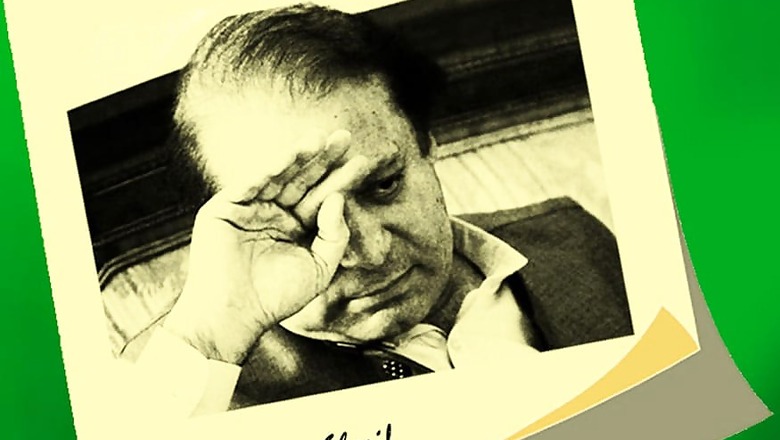
views
Mian Muhammad Nawaz Sharif, thrice elected Prime Minister of Pakistan, is the 20th Prime Minister in Pakistan’s history not to complete his term. No one ever has.
It is a staggering statement. From Liaquat Ali Khan, the first Prime Minister who was assassinated right down to Sharif, every civilian ruler has been ousted before he could complete his term, with one exception, Asif Ali Zardari of the Pakistan People’s Party, who was not the Prime Minister but the President of the country.
Prima facie, the case before the Supreme Court was about corruption. Nawaz Sharif through his family was implicated in the Panama Papers scandal that rocked the world over the last one year. Seizing on the opportunity, opposition politician Imran Khan and his party, Pakistan Tehreek-e-Insaf (PTI), went to the Supreme Court under Article 184(3) of the Constitution of Pakistan.
Article 184(3) gives Supreme Court the power to hear matters of public importance and fundamental rights. Initially the Supreme Court registrar dismissed the matter as frivolous but with Imran Khan and PTI threatening agitation on the streets, the Supreme Court finally admitted the petition for hearing in November 2016.
After about 6 months of hearings, the five member Supreme Court bench gave its first decision where two judges, Justice Gulzar and Justice Khosa decided that the Prime Minister stands disqualified under Articles 62 and 63 of the Constitution for having lied about his properties in the parliament.
Three judges, Justice Azmat Saeed, Justice Ejaz Afzal and Justice Ijaz-ul-Ahsan mean ruled that the matter needed to be investigated further through a Joint Investigation Team (JIT) which gave its report on July 10, 2017. The arguments were heard on the JIT’s findings from July 17, 2017 to July 21, 2017 by the three judges following which the matter reverted to five member bench and now five judges have unanimously declared Nawaz Sharif disqualified from holding his seat as a Member of the National Assembly thereby disqualifying him as Prime Minister.
Also disqualified is the Finance Minister of Pakistan, Mr. Ishaq Dar and Captain Safdar, Nawaz Sharif’s son in law. The Supreme Court has also ordered the National Accountability Bureau to initiate references against the Sharif family, including his daughter and two sons.
Constitutionally this will remain a highly controversial decision, even in a country no stranger to controversial decisions. The Constitution prescribes a prescribed route by which a member of the National Assembly can be disqualified and that is through the Election Commission of Pakistan.
The Supreme Court’s assumption of this jurisdiction is going to have its own consequences. There are similar cases pending before the Supreme Court against Imran Khan and his financier Jahangir Khan Tareen, who may well go down the same route now that the Pandora’s box has been opened. This will create an unprecedented situation where leaders of the two biggest parties might well end up being disqualified and there will be a leadership vacuum. Who will fill such a vacuum is a question that must keep the well-wishers of Pakistan and its democracy up at night.
Pakistan’s civ-mil has always been problematic. This decision is being hailed as a case of the powerful being brought to the book. However, critics legitimately ask why it is always the elected civilian leadership that faces the brunt of “accountability”. Why are there still holy cows that go unpunished? They might legitimately point to the fact that General Musharraf, who suspended the Constitution twice, was never held accountable. The case of High Treason against the former dictator-president under Article 6 of the Constitution remains in cold storage while Musharraf lives merrily abroad. He has released a statement praising the Sharif decision as a victory for rule of law. It seems that the rule of law applies only to the common man and their elected representatives but never to those powerful institutions whose functionaries wear uniforms or robes.
Those of us who look back at the patchy judicial history of the country, rue so many dark days. There was the Tameezuddin Case in 1955 that upheld the dismissal of Pakistan’s first constituent assembly. There was Dosso case in 1958 which legitimized Pakistan’s first military coup. There was Bhutto case in 1979 that sent Zulfikar Ali Bhutto to the gallows and which even the Supreme Court does not consider as a valid precedent. Zafar Ali Shah Case was another such case gave legal cover to General Musharraf’s coup. In 2012, another elected Prime Minister Yousaf Raza Gilani was sent packing for contempt of court. This present decision will rank with those equally. History will record its verdict that those who supported this decision did so with good intentions but that the road to hell is often paved with those.
(Yasser Latif Hamdani is a constitutional lawyer in Pakistan and author of the book Jinnah: Myth and Reality. Views expressed are personal)



















Comments
0 comment